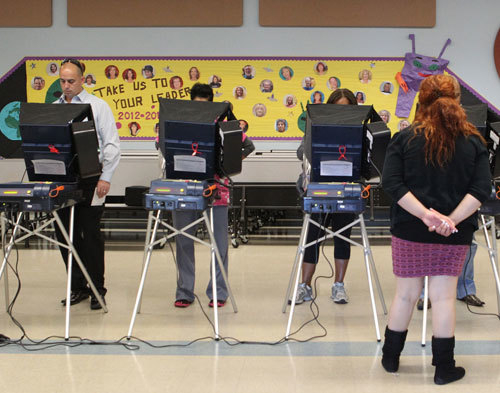Miller calls for voter photo ID law in Nevada

CARSON CITY – Spurred by many Nevadans complaining during this year’s contentious elections that some people were voting illegally, Secretary of State Ross Miller said Tuesday he will sponsor a bill at the Legislature to require voter photo IDs.
Under his proposal, which lawmakers will consider in 2013, the photos on residents’ driver’s licenses would be placed electronically with their voter registration records and in the poll books at election locations. People without any identification, but who are registered, would be required to have their pictures taken by poll workers and sign an affidavit that they are the person they represent the first time they vote.
Miller said Minnesota estimated it would cost $15 million to $20 million to implement a similar program, but legislators rejected the bill. Minnesota has twice the population of Nevada.
"There is a cost," Miller said. "It will cause some delays (in voting), and that will be part of the debate. But it is the way to do it. This will eliminate any opportunity for someone to impersonate some other person when you come to vote. This will eliminate any concerns about voter fraud."
Other than hearing people demand a voter ID program, Miller gave no reason or incidents of fraud that prompted him to propose his bill.
But during the fall campaign, he held a news conference to dismiss reports that there was voter fraud and voting machine manipulation in Nevada. His office did arrest one woman in Las Vegas on allegations that she tried to vote twice.
Assembly Minority Leader Pat Hickey, R-Reno, commended Miller for proposing a voter ID bill.
"The fact that the current system does not require any voter identifications rubs a lot of people the wrong way," Hickey said. "I think the concept is very worthy of looking into. We need to see the details. The integrity of elections is at the center of believable democracy."
The Democratic Party has argued that voter ID laws will lead to less participation by minority and poor voters. But others disagree. The Wall Street Journal reported in October that voting by minorities has increased since most state voter ID laws were passed.
Thirty states now have voter identification laws, but none of them is like the one Miller proposes. Some identify voters in ways other than photos.
Current Nevada law requires poll workers to compare signatures the voters sign in the poll book with the signature they signed when they originally registered. If the two don’t match, the poll worker can ask for more identification, including a driver’s license.
Miller said federal court decisions prevent charging for voter IDs because some people cannot afford them. Courts consider such a charge a poll tax that disenfranchises people.
His bill would place no additional costs on the voter.
A New York study found 11 percent of eligible U.S. voters do not have any government-issued IDs. Polling places in Nevada would have to be equipped with cameras if Miller’s proposal receives approval.
There are cases when legitimate voters forgot to bring their wallets to the polls, and in voter photo ID states, they would be sent home and return with an ID, Miller said. His proposal that would solve that problem because the voter’s photo would be in the poll book, he said.
Although Republicans, not Democrats, generally have championed voter ID laws, Miller said the Minnesota secretary of state, who is a Democrat, proposed the photo ID bill, and the Republican legislators opposed it.
"I am not sure why they would oppose it," Miller said. "It suggests to me you are after something else."
But that Minnesota governor later rejected a Republican voter ID bill. Also, voters in that state defeated a constitutional amendment for a voter ID requirement Nov. 6.
Miller said he will introduce an unrelated bill that would block legislators and all elected officials, including himself, from accepting any meals, gifts or anything of value from lobbyists, companies and others who have financial or business interests in what elected officials can do for them.
Average citizens still could give officials gifts or treat them to dinner or drinks, but they would have to report expenditures of more than $200. But Miller said it will eliminate cases of lobbyists taking legislators to Adele’s, a pricey and highly rated restaurant in Carson City.
"I disclose everything," said Miller about the gifts he accepts. "Almost everyone discloses zero gifts. I see these people at the same events I attend."
Contact Capital Bureau Chief Ed Vogel at evogel@reviewjournal.com or 775-687-3901.